Updated: January 26, 2026
Written by Dan Simms
Laura Madrigal is the Home Design Specialist at Fixr.com, dedicated to identifying and analyzing significant changes within residential design. She is the author of leading trends reports on interior design, kitchen, and bathroom, and her insights have been featured in publications like Realtor and the New York Post.
Learn moreReviewed by Laura Madrigal
The national average cost to repair a boiler is $450, and most homeowners pay between $150 and $750. Your costs can range widely depending on the type of boiler you have, the specific issue you’re dealing with, and the local labor costs in your area.
Your boiler is one of the most crucial components in your home, as it maintains a safe and comfortable temperature during cold weather, and in many cases, it also provides hot water for washing and bathing. Boilers see a lot of wear and tear, so staying ahead of major issues by carrying out routine repairs can end up saving you time, money, and frustration.
Cost of Boiler Repair

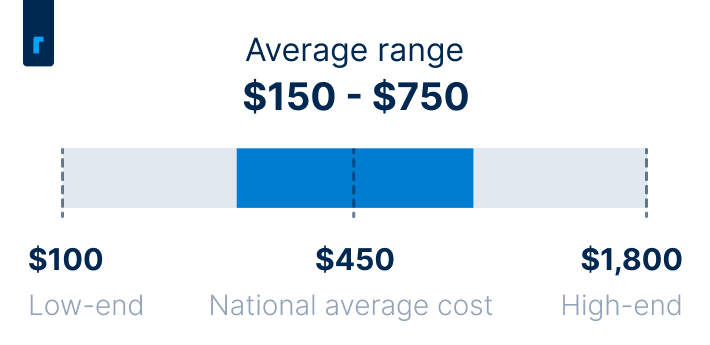
Boiler Repair Cost by Fuel
The fuel source your boiler uses will have an impact on the components that can fail, so fuel source plays a role in average boiler repair costs, as well. Nearly half of all homes in the U.S. use natural gas as a fuel source for heating, so gas boiler service costs are the most common. Luckily, these also tend to be the most affordable.

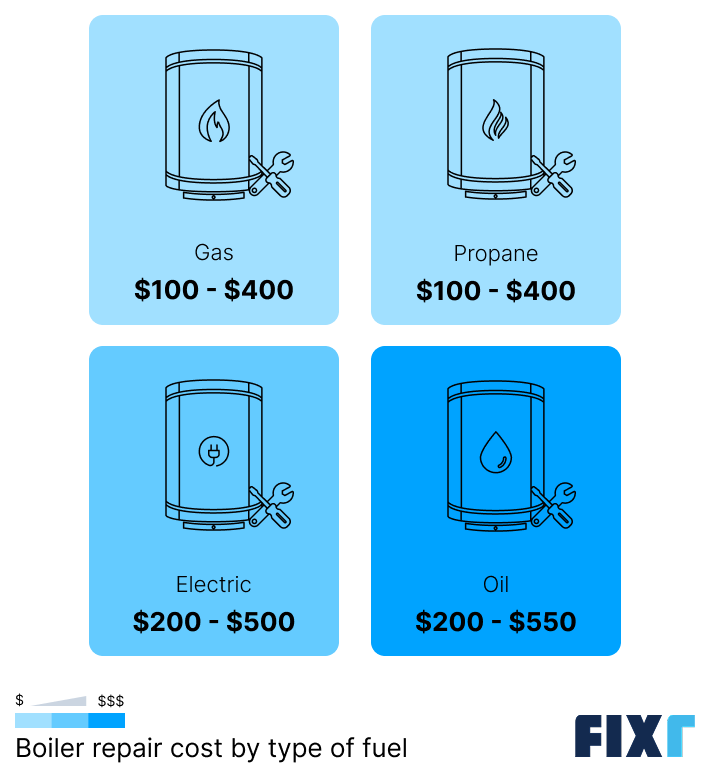
Type | Repair Cost |
Gas | $100 – $400 |
Propane | $100 – $400 |
Electric | $200 – $500 |
Oil | $200 – $550 |
Gas
Gas unit repairs typically cost between $100 and $400, depending on the component that needs repair or replacement. Prices can climb much higher if you have more severe issues, like a leaking gas line, but most will cost between $100 and $400 to fix. The average process to fix a gas unit involves cleaning or repairing valves, regulators, and lines.
Propane
Propane boilers are fundamentally very similar to natural gas boilers, so, while the components differ in size and the systems use different pressures, repairs will still cost between $100 and $400. Similar to issues with a gas boiler, a leak in the propane lines or tanks can drive your project costs significantly higher.
Electric
The cost to fix an electric boiler will usually fall between $200 and $500. Electric boilers have components that other types don’t, including electric heating elements, and these can cost more than the components in gas and propane systems. Additionally, electric boilers are relatively uncommon, despite electric heat being prevalent in the U.S. As such, fewer companies provide services.
Oil
An oil boiler service costs between $200 and $550, on average, making it the most costly to fix. Oil boilers require “oil guns” to allow the system to burn a liquid fuel, and issues with this component contribute to those higher repair costs. Oil is also a less efficient and “dirtier” fuel than gas and propane, so the higher risk of residue and soot drives repair costs higher and makes repairs more common.
Boiler Repair Cost by Replacement Part
Your boiler repair costs will depend largely on the specific component that fails and needs repair or replacement. Individual components can cost between $100 and $1,100 to replace, so this is a major cost factor to consider. If you know what’s wrong with your boiler, you can use the table below to get an idea of what the repair will cost you, but you should consult an HVAC professional before moving forward with a repair to be sure.
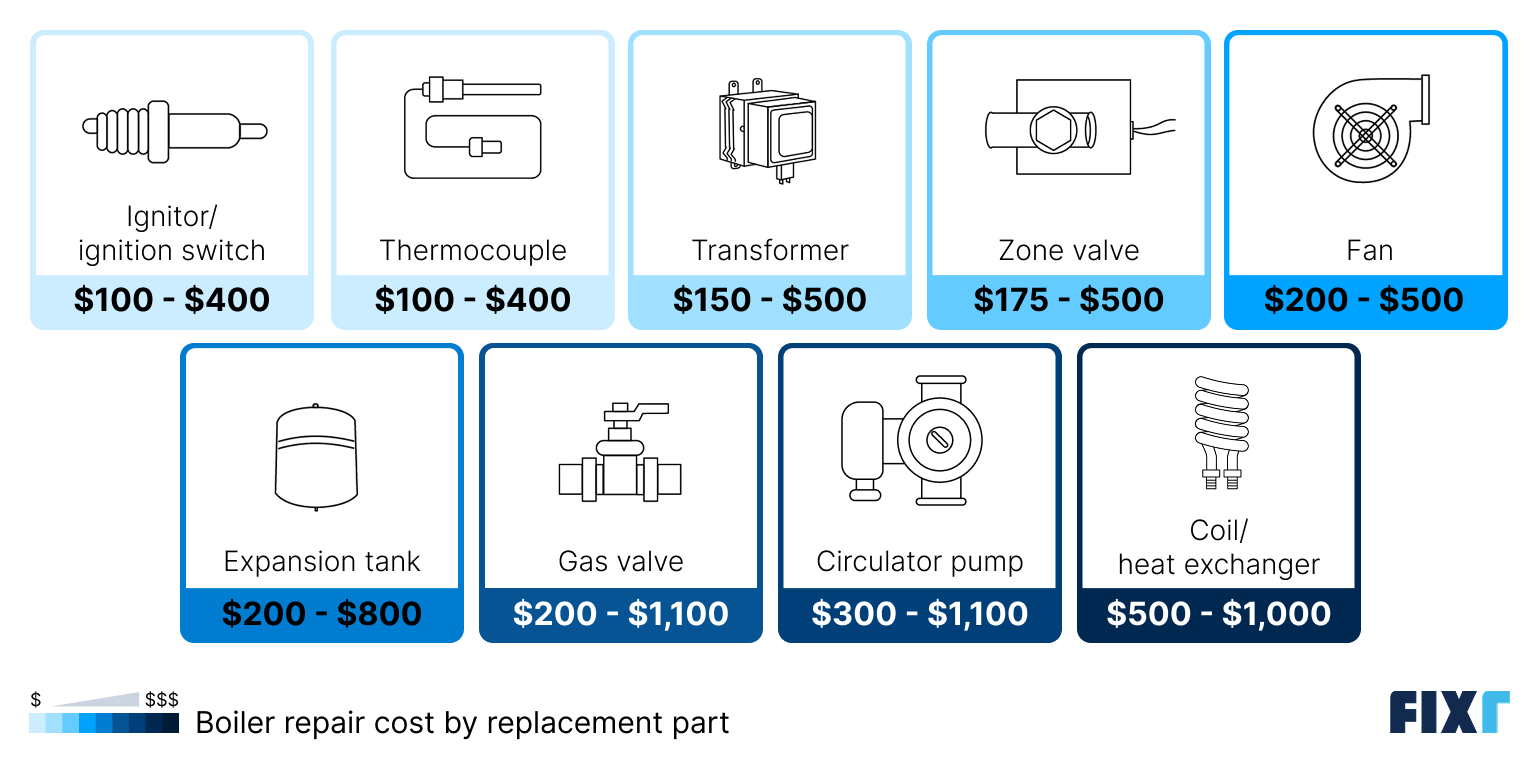
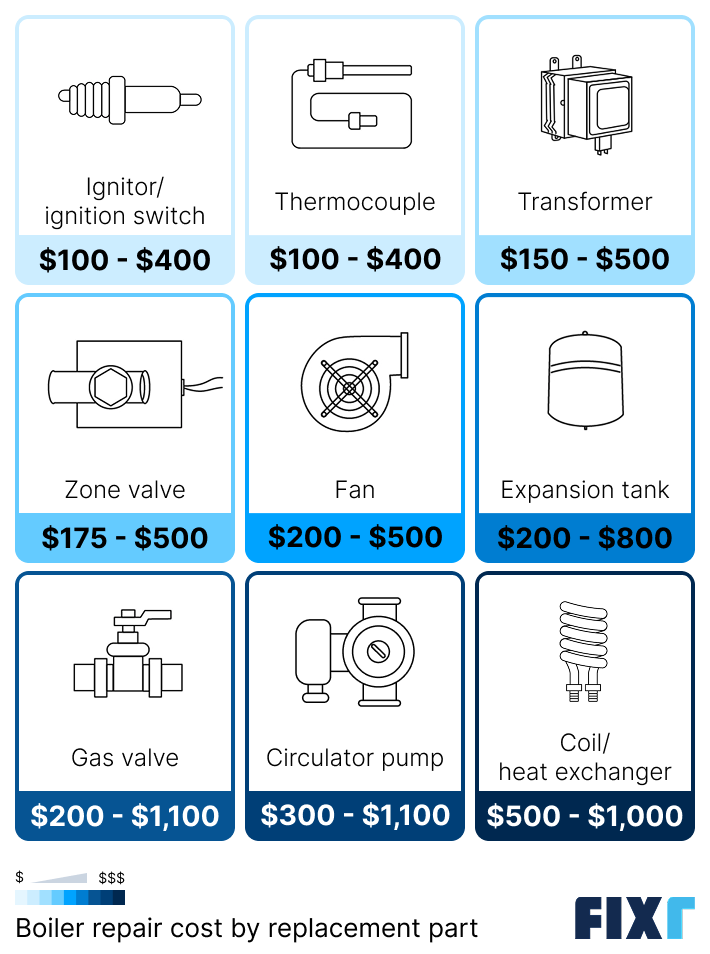
Part | Repair Costs |
Ignitor/ignition switch | $100 – $400 |
Thermocouple | $100 – $400 |
Transformer | $150 – $500 |
Zone valve | $175 – $500 |
Fan | $200 – $500 |
Expansion tank | $200 – $800 |
Gas valve | $200 – $1,100 |
Circulator pump | $300 – $1,100 |
Coil/heat exchanger | $500 – $1,000 |
Ignitor/Ignition Switch
The ignition switch and ignitor are responsible for igniting the fuel that comes into your boiler. If your boiler unexpectedly shuts off or won’t turn on, these components could be causing the issue. Replacing them costs between $100 and $400.
Thermocouple
Gas and propane boilers typically have thermocouples, which detect whether or not your pilot light is lit and can shut the gas valves if the pilot light goes out. Replacing a thermocouple costs between $100 and $400 in most cases.
Transformer
A transformer is a component that steps down your home’s electrical voltage to a level that’s appropriate for low-voltage boiler components. Replacing a transformer costs between $150 and $500.
Zone Valve
A zone valve regulates how much hot water your boiler sends to individual zones in your home. Some systems don’t have zone valves at all, but if yours does and you have a problem with one, you’ll notice that a portion of your home gets too much heat or not enough. Boiler valve replacement costs between $175 and $500 if your issue is with a zone valve.
Boiler Fan
Boilers use fans to vent efficiently through flue pipes, so this is a crucial component for safe operation and to avoid the build-up of deadly gases in your home. Replacing a boiler fan will run you between $200 and $500, in most cases.
Expansion Tank
Boilers use an expansion tank to regulate the pressure inside the closed system that delivers hot water throughout your home, which changes as water inside heats and cools. Replacing a faulty expansion tank costs between $200 and $800.
Gas Valve
A gas valve on a gas or propane boiler regulates how much gas is delivered to your boiler. Issues with this component can cause dangerous gas leaks and may result in insufficient heat. Repairing a gas valve costs between $200 and $1,100.
Pump
The circulating pump in your boiler is responsible for distributing hot water through your baseboard heat system or to your radiators. These components are relatively expensive, with the cost to replace a boiler pump costing between $300 and $1,100.
Coil
A heat exchanger coil transfers heat to the water in your heating system from the burning fossil fuels. In an electric boiler, the heat exchanger coil transfers heat from an electrical current instead. In either case, boiler heat exchanger replacement costs between $500 and $1,000.
Boiler Repair Costs by Problem
Most homeowners understandably won’t be able to identify a specific component that needs repair or replacement and instead will have an idea of the more apparent issue. You can use the table below as a general guide for pricing out repairs based on the problem you’re experiencing, but note that it’s always best to have an HVAC pro in to assess the issue and figure out the best course of action.
Some of the most common issues include a lack of heat and leaks. Fixing a boiler that isn’t supplying heat can cost between $200 and $1,000, and leaking boiler repair costs between $175 and $800.

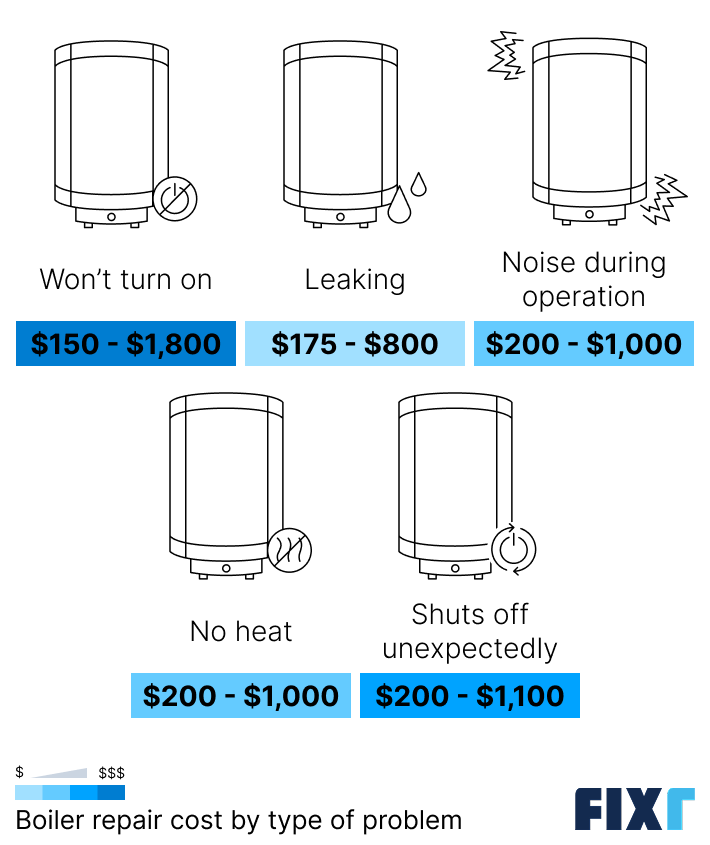
Problem | Repair Cost (Labor Included) |
Boiler won’t turn on | $150 – $1,800 |
Leaking boiler repair cost | $175 – $800 |
Noise during operation | $200 – $1,000 |
No heat | $200 – $1,000 |
Boiler shuts off unexpectedly | $200 – $1,100 |
Labor Cost to Repair a Boiler
Boiler repair labor is often billed in one of two ways: a flat service fee or an hourly rate. Many service technicians charge an hourly rate of $75 to $150 per hour plus the cost of parts. Alternatively, a professional may charge a flat fee of $150 to $300, depending on the complexity of the issue.
Since most homeowners don’t know the underlying issue before they consult a professional, you’ll most likely pay a call-out fee or diagnostic fee. This initial fee typically ranges from $75 to $250 and often covers the first hour of work. It is common for companies to waive this fee if you decide to proceed with the repair service from the same company.
Labor costs can climb significantly higher if you need emergency service, or if you need rushed services on a weekend or holiday, due to the inconvenience.
Additional Costs and Considerations
The type of boiler you have and the underlying problem you’re experiencing are the most significant cost factors to consider, but there are some other things that can affect your total cost and some things you should consider before you call for service.
Boiler age: Generally speaking, repairs for older boilers will be more costly, not only because of the higher risk of multiple components failing but also because parts may have a lower availability.
Warranty coverage: Before you schedule any boiler maintenance or repairs, check to see if your unit is under warranty. If it is, your warranty may cover the parts, labor, or both.
Maintenance history: If you’ve kept up with routine inspections and tune-ups, chances are your repair costs will be well below average. If it has been years since your last service, expect prices to climb higher, in part because of the higher cleaning costs and the higher risk of damaged components.
Boiler size: The size of your boiler can have a minor impact on your repair costs, as larger boilers suited for homes with more square footage may require more materials or labor to repair.
Boiler type: The type of boiler you have can affect repair costs, too, as more complicated styles that handle heat and domestic hot water have more components that can fail. For example, a combi boiler service costs more than a heat-only boiler repair.
Annual boiler maintenance cost and inspection: It’s a good idea to budget for an annual boiler tune-up and inspection, which will help keep your system running smoothly and avoid unexpected breakdowns. An annual tune-up and boiler inspection costs between $200 and $500.
Signs Your Boiler Needs Repairs
Understanding when your boiler is in need of repairs can help you stay ahead of worsening issues and even avoid unexpected breakdowns and potentially dangerous no-heat situations. Here are a few key things to look out for that can indicate it’s time to call in a pro:
Lack of heat: One of the most obvious signs you need boiler repair is a lack of heat entirely. If you confirm you still have power, your boiler switch is on, and you have fuel, but you’re still not getting heat, call in a professional immediately.
Noisy operation: If you start hearing unusual noises, including clicking, banging, or clinking, it might be time to schedule maintenance or repairs.
Boiler cycling on and off: If your boiler turns on and off repeatedly or shuts off just a few seconds after it comes on, there’s likely a malfunction that needs expert attention..
Leaks: Any visible leaks around your boiler should prompt a call to an HVAC technician. Leaks could be a sign of severe damage, but even if they’re not, they can lead to higher utility bills, mold growth, and an increased risk of pest infestation.
Old age: Boilers usually last for 15 years or more. If your unit is approaching the end of its useful life, it’s a good idea to schedule routine tune-ups, inspections, and repairs to get the most value possible out of your equipment. Boiler tune-ups cost less than repairs in many cases, especially with old boilers.
Lack of maintenance: Even if your boiler should have years of life left, it’s a good idea to call a professional in for an inspection and repairs if you haven’t been keeping up with routine maintenance.
Boiler Repair vs. Boiler Replacement Cost
In almost all cases, boiler repair is going to be more affordable than boiler replacement. On average, it costs $450 to repair a boiler, while a complete boiler replacement costs an average of $6,100. Even the most expensive boiler repair cost of $1,800 is going to be under the average total replacement cost.
With that being said, there are some situations in which replacement is a better option overall. For example, if the repair cost is 50% or more of the cost to replace a boiler, a replacement is likely going to be the better financial option in the long run. You should also consider replacing your unit if it’s over 15 years old, has ongoing issues that keep driving up repair costs, shows signs of inefficiency like rising energy bills, or has experienced any gas or carbon monoxide leaks, as a new boiler system will likely be safer and more efficient in the long run. Replacing is often the most cost-effective strategy for an aging or failing system.
DIY Boiler Repair vs. Hiring a Professional
While the labor for boiler repair can account for up to nearly half of your total boiler repair cost, hiring a professional is still the best option when it comes to fixing your home’s heating source. Boilers are complicated pieces of equipment that involve electricity, water, and combustible gases, in some cases, so hiring a professional is the best way to ensure a proper repair and your own safety.
A professional can also identify potential issues that could become problems in the future, potentially saving you money on more significant repairs or on your utility bills due to increased boiler efficiency.
Ways to Save on Boiler Repair Costs
While DIYing usually isn’t a wise way to save money on the cost of boiler repair, there are some things you can do to help keep costs down.
Schedule annual maintenance: Annual servicing can prevent major breakdowns by identifying minor problems early, potentially saving thousands of dollars in repair costs. Plus, routine services improve boiler efficiency, which can offer savings on heating bills.
Check your warranty or service plan: If your boiler is still under warranty or you have a service contract, the parts, labor, or both may be covered. Calling on your warranty could significantly reduce or eliminate your out-of-pocket costs.
Get multiple quotes: Always get at least three quotes from different local contractors to compare pricing and find the best value for your repair.
Address issues early: Fix minor problems as soon as they arise. Small problems that are ignored can develop into larger, more expensive repairs.
Schedule work for the off-season: HVAC contractors may offer lower labor rates in the spring and summer when demand for heating services is lower. While you shouldn’t put off necessary repairs, staying ahead of the curve and scheduling services ahead of time can help you save on labor fees.
FAQs
Repairing a boiler is usually worth it, as boiler repairs cost about 10% of what a total replacement would run you. Repairs are especially worthwhile if the unit is relatively new and the problem is minor.
You should have a boiler inspection and tune-up completed once per year. Annual maintenance ensures safe and efficient operation, reduces the risk of unexpected breakdowns, and may be required to keep the manufacturer’s warranty valid. An annual maintenance plan can also help reduce your heating costs and extend the lifespan of your unit.
The decision to repair or replace your boiler depends on the age of the unit and the cost and severity of the repair. If your boiler is 15 years or older, repairs cost more than half the price of a new unit, or your boiler has given you repeated problems, replacement is usually best. A newer model will also be more energy-efficient, which can lower utility bills over time, leading to significant long-term savings that justify the upfront expense.
Most boilers last for around 15 years, though some may last up to 20 years or longer. You can extend the lifespan of your boiler by carrying out routine maintenance and tune-ups.
The average cost for an annual boiler servicing is between $200 and $500, depending on the type of boiler you have, the fuel source, the size (measured in BTU), and the accessibility. The cost can also vary depending on your location and the cost of living in your area, as well as the experience of the technician you hire.
Boiler repairs can get expensive because the system is complex, consists of many moving parts, and involves dangerous components, like high-pressure water tanks, electrical components, and combustible fuel. Licensed professionals who work on boilers also have higher per-hour labor rates.
The most common boiler problems are a lack of heat and visible leaks, often caused by component failure or system pressure issues. A boiler failing to supply heat typically costs between $200 and $1,000 to repair, while fixing a leak generally ranges from $175 to $800. These issues frequently stem from a faulty ignitor or thermocouple ($100–$400) or a failing expansion tank ($200–$800) which is responsible for regulating pressure. Other frequent culprits include "kettling" noises caused by limescale buildup and air trapped in the system, both of which can be prevented with a standard annual service costing between $150 and $500.
